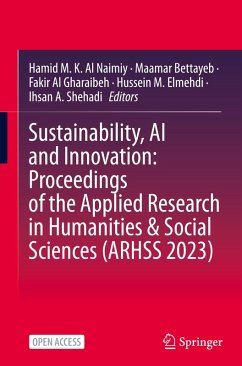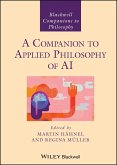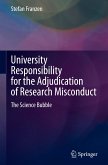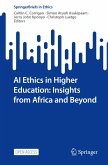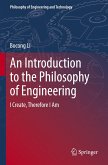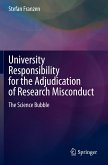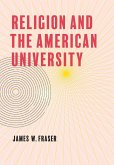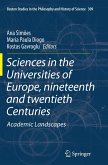Sustainability, AI and Innovation: Proceedings of the Applied Research in Humanities & Social Sciences (ARHSS 2023)
Herausgegeben:Al Naimiy, Hamid M. K.; Bettayeb, Maamar; Gharaibeh, Fakir Al; Elmehdi, Hussein M.; Shehadi, Ihsan A.
Sustainability, AI and Innovation: Proceedings of the Applied Research in Humanities & Social Sciences (ARHSS 2023)
Herausgegeben:Al Naimiy, Hamid M. K.; Bettayeb, Maamar; Gharaibeh, Fakir Al; Elmehdi, Hussein M.; Shehadi, Ihsan A.
- Gebundenes Buch
- Merkliste
- Auf die Merkliste
- Bewerten Bewerten
- Teilen
- Produkt teilen
- Produkterinnerung
- Produkterinnerung
This open-access book presents the proceedings of the first 1st International Conference on Applied Research in Humanities & Social Sciences (ARHSS) held from Oct 31 to Nov 02, 2023, at the University of Sharjah, United Arab Emirates. It showcases the latest advances in research related to digital, ethical, and advanced crime prevention and enhancing social security. In addition, the topics include sustainability and innovation in economy, society, and governance (ESGs). The topics also tackle current issues, focusing on Artificial Intelligence (AI) and its wide applications in humanities and…mehr
Andere Kunden interessierten sich auch für
![A Companion to Applied Philosophy of AI A Companion to Applied Philosophy of AI]() M HähnelA Companion to Applied Philosophy of AI137,99 €
M HähnelA Companion to Applied Philosophy of AI137,99 €![University Responsibility for the Adjudication of Research Misconduct University Responsibility for the Adjudication of Research Misconduct]() Stefan FranzenUniversity Responsibility for the Adjudication of Research Misconduct83,99 €
Stefan FranzenUniversity Responsibility for the Adjudication of Research Misconduct83,99 €![AI Ethics in Higher Education: Insights from Africa and Beyond AI Ethics in Higher Education: Insights from Africa and Beyond]() AI Ethics in Higher Education: Insights from Africa and Beyond23,99 €
AI Ethics in Higher Education: Insights from Africa and Beyond23,99 €![An Introduction to the Philosophy of Engineering An Introduction to the Philosophy of Engineering]() Bocong LiAn Introduction to the Philosophy of Engineering117,69 €
Bocong LiAn Introduction to the Philosophy of Engineering117,69 €![University Responsibility for the Adjudication of Research Misconduct University Responsibility for the Adjudication of Research Misconduct]() Stefan FranzenUniversity Responsibility for the Adjudication of Research Misconduct76,99 €
Stefan FranzenUniversity Responsibility for the Adjudication of Research Misconduct76,99 €![Religion and the American University Religion and the American University]() James W FraserReligion and the American University54,99 €
James W FraserReligion and the American University54,99 €![Sciences in the Universities of Europe, Nineteenth and Twentieth Centuries Sciences in the Universities of Europe, Nineteenth and Twentieth Centuries]() Sciences in the Universities of Europe, Nineteenth and Twentieth Centuries91,99 €
Sciences in the Universities of Europe, Nineteenth and Twentieth Centuries91,99 €-
-
-
This open-access book presents the proceedings of the first 1st International Conference on Applied Research in Humanities & Social Sciences (ARHSS) held from Oct 31 to Nov 02, 2023, at the University of Sharjah, United Arab Emirates. It showcases the latest advances in research related to digital, ethical, and advanced crime prevention and enhancing social security. In addition, the topics include sustainability and innovation in economy, society, and governance (ESGs). The topics also tackle current issues, focusing on Artificial Intelligence (AI) and its wide applications in humanities and social sciences. Given its scope, the book is essential for scholars, students, policy-makers, and education practitioners interested in better keeping up with the latest advances in this critical field.
Produktdetails
- Produktdetails
- Verlag: Springer / Springer Nature Singapore / Springer, Berlin / University of Sharjah
- Artikelnr. des Verlages: 978-981-96-2531-4
- Seitenzahl: 524
- Erscheinungstermin: 2. Juli 2025
- Englisch
- Abmessung: 241mm x 160mm x 34mm
- Gewicht: 889g
- ISBN-13: 9789819625314
- ISBN-10: 9819625319
- Artikelnr.: 72528553
- Herstellerkennzeichnung
- Springer-Verlag GmbH
- Tiergartenstr. 17
- 69121 Heidelberg
- ProductSafety@springernature.com
- Verlag: Springer / Springer Nature Singapore / Springer, Berlin / University of Sharjah
- Artikelnr. des Verlages: 978-981-96-2531-4
- Seitenzahl: 524
- Erscheinungstermin: 2. Juli 2025
- Englisch
- Abmessung: 241mm x 160mm x 34mm
- Gewicht: 889g
- ISBN-13: 9789819625314
- ISBN-10: 9819625319
- Artikelnr.: 72528553
- Herstellerkennzeichnung
- Springer-Verlag GmbH
- Tiergartenstr. 17
- 69121 Heidelberg
- ProductSafety@springernature.com
Hamid M.K. Al Naimiy, Chancellor of the University of Sharjah, General Director and Founder of the Sharjah Academy for Astronomy, Space Sciences and Technology (SAASST) and President of the Arab Union for Astronomy and Space Sciences (AUASS) in the United Arab Emirates, is a renowned scientist in the fields of astronomy and astrophysics and a leader in education. He has held numerous senior level administrative positions, including Academic Department Chair, Dean of the College of Arts and Sciences, and Vice Chancellor for Academic Affairs, in addition to his current positions. He has served as the chief/associate editor for over 10 journals and edited books and has been a keynote speaker at more than 250 national and international conferences, symposia, and workshops, including the IAU conference. He has published more than 30 books (in the fields of astronomy, space sciences and education), authored over 800 scientific articles, published in newspapers, magazines and journals, and refereed over 130 publications in indexed journals. Professor Al Naimiy has been the recipient of numerous awards, including the prestigious Khalifa Award for Education 2009/2010 (in the field of higher education), UAE, and the IAU and UNESCO Award for Outstanding Contribution to the Success of the International Year of Astronomy 2009. Maamar Bettayeb received his Ph.D. in Electrical Engineering from University of Southern California, Los Angeles, in 1981. He has been Professor at University of Sharjah UAE since August 2000. He also held key leadership positions including Advisor to the Chancellor for Graduate Studies and Scientific Research (2004-2006), Director of Research and Studies Center (2005/2006) and Vice Chancellor for Research and Graduate Studies at University of Sharjah (UOS), starting September 2014. He was the chair and co-chair, chair of organizing and scientific committee of several key international conference, e.g. ISSPA 2007, SHJEDU2022. He was Associate Editor of the International Journal of Modeling, Identification and Control. He was the leader of intelligent systems research group at UOS. He also led the development of the Strategic Planning for Research at University of Sharjah. He has published over 350 journal and conference papers in the fields of control and signal processing. Hussein Elmehdi is the Dean of Academic Support Services and an Associate Professor of Biomedical Physics at the Department of Applied Physics and Astronomy. He obtained his PhD in 2001 from the University of Manitoba, Canada in Biomedical Physics. He joined the University of Sharjah (UOS) in Feb 2005 as a Biomedical Physicist. Dr. Elmehdi is very active in several research areas covering biomedical applications of ultrasound, environmental acoustics, health & environmental physics, online education and remote learning. Dr. Elmehdi is participating several well-funded international and national research projects. Dr. Elmehdi has over 100 refereed publications in high impact factor journals, well-known international conferences and book chapters as well as two registered patents. He is the chief scientific judge at the Emirates Foundation for Youth Development and Ministry of Educations. He has received numerous excellence awards and recognitions in research, teaching and community services. Among these awards are the prestigious UoS Excellence Award in Research (2014); UoS Excellence Award in Teaching (2015, 2012); UoS Excellence Award in Community Services (2011), Transformational Leadership Awards (Tahawil Tech) 2020, UOS Excellence Award in Leadership (2021). Fakir Al Gharaibeh Fakir Al Gharaibeh is a Professor of Social Work and Social Policy, currently serving as the Director of the Research Institute of Humanities and Social Sciences (RIHSS) and the Center for Family and Child Studies (CFCS) at the University of Sharjah, UAE. He also holds the title of Honorary Professor at the University of Jordan. Professor Al Gharaibeh earned his PhD from Curtin University of Technology, Australia (2006), and completed advanced training in teaching and learning in social work at Brunel University and the University of Reading, UK. His multidisciplinary research spans social innovation, digital humanities, mental health, divorce, refugees, child abuse, criminal justice, and Arab youth. He has an extensive publication record in national and international journals, has served as a consultant on family policies, and has successfully secured numerous research grants. As a guest editor, he oversaw a special issue of The Journal of International Women's Studies published by Bridgewater State University. He also serves on the Editorial Boards of International Social Work (SAGE) and RUDN Journal of Sociology (Russia). Professor Al Gharaibeh is a member of several prestigious international professional associations, including the American and Australian Social Work Associations. His significant contributions to academia and community service have earned him notable accolades, such as the Leadership Award in Research and Graduate Studies and the Sharjah Voluntary Work Award for Research. Ihsan A. Shehadi earned his Bachelor's degree from the American University of Beirut, Lebanon, and his Ph.D. degree in Physical Chemistry from Northeastern University, Boston- Massachusetts, U.S.A. Dr. Shehadi have published more than 55 peer evaluated research papers in reputable international journals and conference proceedings in the areas of physical chemistry, computational chemistry chemical education and heterogeneous catalysis. During the past few years, his research is focusing using computational chemistry and bioinformatics tools (Docking, Molecular Dynamic simulations, sequence alignments, active sites searches, structural genomics) to search for potential inhibitors for selected enzymes. He had numerous contributions in developing curricula, experiments, assessment tools and instructional methodologies in chemical science. During his academic career he contributed heavily in the organization of many events as conferences, competitions, students' supervision at the graduate and undergraduate levels, workshops, etc.
Chapter 1. Unveiling Link Between Prayer and Wellbeing: A Systematic Literature Review.- Chapter 2. Exploring the Impact of Artistic Practices on Undergraduate Student Stress Levels: An Applied Research.- Chapter 3. An Evolving Research culture: Insights into a Current Multidisciplinary Study on Covid-19.- Chapter 4. Insta-Shopping: A Qualitative Study on Consumer Experiences and Purchasing Behavior on Instagram.- Chapter 5.Success Through Islamic Entrepreneurship for Sustainable Development.- Chapter 6. Digital Democracy: The Impact of Digital Election Technology on the Formation of Representative Institutions in the GCC countries.- Chapter 7. The contribution of artificial intelligence (AI) applications to innovation and sustainability in education.- Chapter 8. The Role of Artificial Intelligence in Developing the Educational System in Iraq.- Chapter 9. The Effectiveness of Using Augmented Reality Enhance Children's Attention with Spectrum Autism Disorder.- Chapter 10. Analysis of Fertility Determinants among Emirati Female University Students: An Exploratory Study at a University.- Chapter 11. Religious Inquiries: Between Conventional Islamic Teaching Methods & Islamic Websites among Undergraduate Female Students at the University of Sharjah.- Chapter 12. Greta Thunberg's Activism, Autism, and Resistance to Mobilize Youth for Climate Change Awareness.- Chapter 13. News in the Holy Quran: An analytical study of the news information interpretation in Surah An - Naml.- Chapter 14. Learning Styles Prevalent Among a Sample of Gifted Students with Learning Disabilities in Jordan.- Chapter 15. Psychometric Properties of the Vanderbilt Scale for Detecting Students Who Suffer from Attention Deficit Hyperactivity Disorder in the Cycle one Schools in Al Batinah North Governorate in Oman Based on Rasch Rating Scale Model.- Chapter 16. Learning-on-the-go: The impact of Mobile-based Microlearning on improving functional writing skills, soft skills and reducing cognitive load of Business students.- Chapter 17. Confirmatory Factor Analysis of UAE Teacher Licensing Scales: Empirical Validation.- Chapter 18. Sustainable Agriculture through AI - Powered Pollination: Transforming Large Scale Date Palm Agriculture in Middle East.- Chapter 19. Women Political Participation: The Model of the Arab Emirates.- Chapter 20. Meta-Analysis of Using AI-Based Feedback Systems in Developing College Students' Academic Writing Skills.- 21. The Right to Privacy and Digital Development.- Chapter 22. Perception of Omani Women on Exclusive Breastfeeding.- Chapter 23.Digital Addiction and its Impact on Adolescents in UAE Society.- Chapter 24. Faculty satisfaction and perception of online teaching.- Chapter 25. "Let the Walls Do the Talking!" The Communicative Functions of Graffiti in Jordan.
Chapter 1. Unveiling Link Between Prayer and Wellbeing: A Systematic Literature Review.- Chapter 2. Exploring the Impact of Artistic Practices on Undergraduate Student Stress Levels: An Applied Research.- Chapter 3. An Evolving Research culture: Insights into a Current Multidisciplinary Study on Covid-19.- Chapter 4. Insta-Shopping: A Qualitative Study on Consumer Experiences and Purchasing Behavior on Instagram.- Chapter 5.Success Through Islamic Entrepreneurship for Sustainable Development.- Chapter 6. Digital Democracy: The Impact of Digital Election Technology on the Formation of Representative Institutions in the GCC countries.- Chapter 7. The contribution of artificial intelligence (AI) applications to innovation and sustainability in education.- Chapter 8. The Role of Artificial Intelligence in Developing the Educational System in Iraq.- Chapter 9. The Effectiveness of Using Augmented Reality Enhance Children's Attention with Spectrum Autism Disorder.- Chapter 10. Analysis of Fertility Determinants among Emirati Female University Students: An Exploratory Study at a University.- Chapter 11. Religious Inquiries: Between Conventional Islamic Teaching Methods & Islamic Websites among Undergraduate Female Students at the University of Sharjah.- Chapter 12. Greta Thunberg's Activism, Autism, and Resistance to Mobilize Youth for Climate Change Awareness.- Chapter 13. News in the Holy Quran: An analytical study of the news information interpretation in Surah An - Naml.- Chapter 14. Learning Styles Prevalent Among a Sample of Gifted Students with Learning Disabilities in Jordan.- Chapter 15. Psychometric Properties of the Vanderbilt Scale for Detecting Students Who Suffer from Attention Deficit Hyperactivity Disorder in the Cycle one Schools in Al Batinah North Governorate in Oman Based on Rasch Rating Scale Model.- Chapter 16. Learning-on-the-go: The impact of Mobile-based Microlearning on improving functional writing skills, soft skills and reducing cognitive load of Business students.- Chapter 17. Confirmatory Factor Analysis of UAE Teacher Licensing Scales: Empirical Validation.- Chapter 18. Sustainable Agriculture through AI - Powered Pollination: Transforming Large Scale Date Palm Agriculture in Middle East.- Chapter 19. Women Political Participation: The Model of the Arab Emirates.- Chapter 20. Meta-Analysis of Using AI-Based Feedback Systems in Developing College Students' Academic Writing Skills.- 21. The Right to Privacy and Digital Development.- Chapter 22. Perception of Omani Women on Exclusive Breastfeeding.- Chapter 23.Digital Addiction and its Impact on Adolescents in UAE Society.- Chapter 24. Faculty satisfaction and perception of online teaching.- Chapter 25. "Let the Walls Do the Talking!" The Communicative Functions of Graffiti in Jordan.

